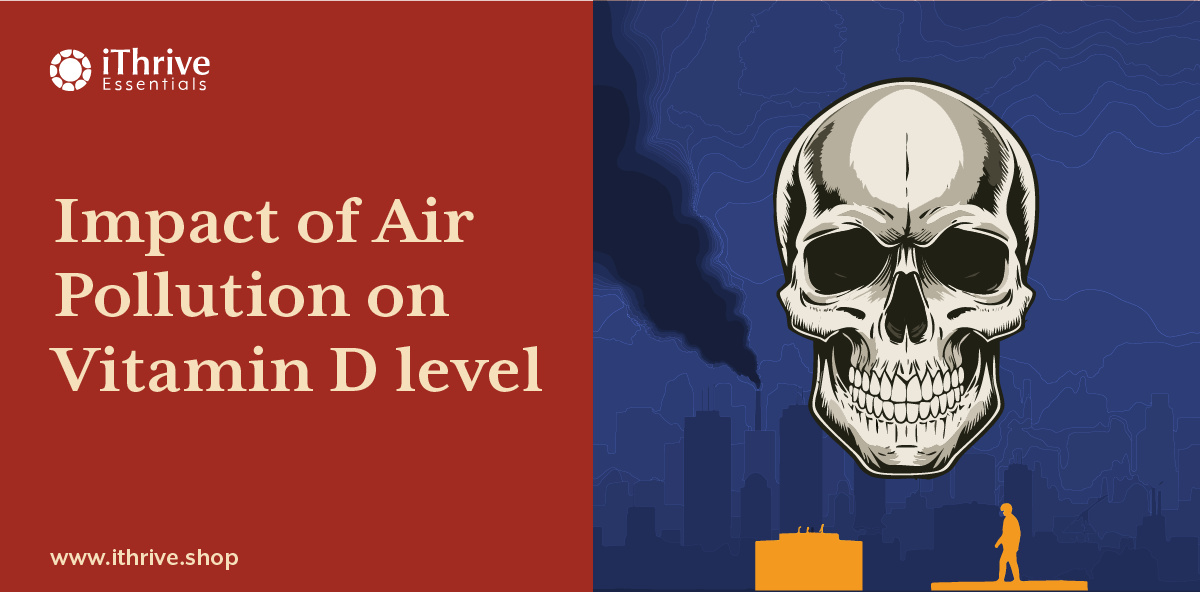
Is air sucking all the Vitamin D?
Smog Walo Ki Dilli?
Looking at the scenario from the past few years, it feels that Dil Walo Ki Dilli has become more like Smog Walo Ki Dilli. The city might soon be renamed along similar lines! The moment you hear the word Delhi, words like AQI, Air Pollution, Smog, and Hazardous start popping into our minds. The air that is supposed to keep us alive is now doing the total opposite. The only thing poor air quality seems to be contributing to is the business of masks and air purifiers.

No doubt, ENT clinics are running over their capacity, given all the respiratory disorders associated with poor air quality. But, it doesn’t stop there! One thing that might be missing our attention is the effect of air pollution on Vitamin D levels. Heard of it for the first time? Don't know the impact of smog on Vitamin D synthesis? Perplexed? Let’s find out in this blog.
Effect of Air Pollution on Vitamin D
To understand the effects of air pollution on Vitamin D, let’s first look at the relationship between sun exposure and Vitamin D levels.
In simple terms, when sunlight hits our skin, the synthesis of Vitamin D takes place. The rays responsible for this process are UVB rays. Thus, sunlight is crucial for the synthesis of Vitamin D. Now, how is air pollution responsible for Vitamin D deficiency? The answer is simple. The pollutants in the air, especially particulate matter, ozone, sulfur dioxide, and nitrogen dioxide, hinder the absorption of UVB radiation in our skin. As a result, our skin cannot make adequate amounts of Vitamin D.
Due to air pollution, it is generally advised to stay indoors. This further aggravates the problem since people get very little or nearly no exposure to sunlight. Moreover, the use of sunscreens with a high sun protection factor further decreases sunlight absorption. In cities like Delhi and other highly polluted cities, Vitamin D deficiency becomes even more common due to these reasons. All of these factors compound over time, leading to Vitamin D deficiency.Also, during winter people fall sick often and that’s when you require a higher dosage of vitamin D.
Vitamin D Deficiency- elephant in the room
Now that we understand the relationship between air pollution and sunlight, let’s discuss the effects of Vitamin D deficiency.
Vitamin D plays an important role in many bodily processes. Its major function is the absorption of calcium. This means, without adequate Vitamin D, your body will suffer from calcium deficiency as well. Other roles of Vitamin D include fighting inflammation, enhancing heart health, aiding glucose metabolism, and modulating immune and neuromuscular function. In children, Vitamin D deficiency can lead to rickets. In adults, it can result in osteoporosis and osteomalacia.
What’s the Solution ? Can You Still Get Adequate Vitamin D?
With all these conditions favoring Vitamin D deficiency, is it still possible to get an adequate amount of sunshine vitamin? Can people in Delhi or other metro cities access this vitamin, which has now become hard to get despite being easily available?

The answer is a big yes! Thanks to iThrive Essentials Vitamin D3 and K2 supplement. It’s sunshine packed in a bottle! The K2 in it helps with the proper transportation of calcium, preventing calcification in arteries and tissues. The MCT oil formulation acts as the best carrier for both vitamins. How, you ask? Both Vitamin D and Vitamin K are fat-soluble. MCT oil, being fatty in nature, is the perfect carrier for them! This ensures maximum bioavailability of these vitamins. For a detailed dive into our Vegan based Vitamin D supplement, check out our blog on The Benefits of Combining Vitamin D3 + K2 with MCT Oil. It’s a quick yet useful read!
In addition to adding a good supplement to your routine, include fatty fish like tuna, salmon, and mackerel. These are excellent sources of Vitamin D. If you live in an area with clean air, allow yourself adequate sun exposure.
Looking at the current circumstances, it seems that air pollution is here to stay! However, this does not mean we should accept the pollution. Let’s maintain healthy Vitamin D levels while also working towards combating the growing threat of air pollution.



Leave a comment
This site is protected by hCaptcha and the hCaptcha Privacy Policy and Terms of Service apply.